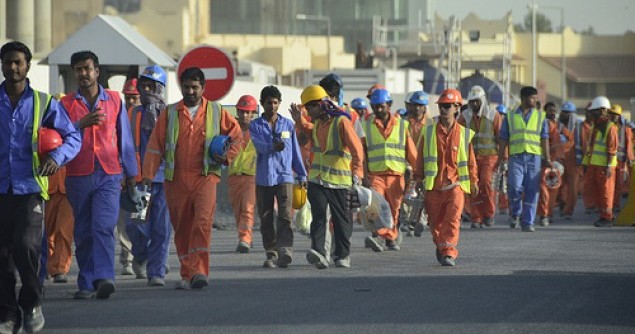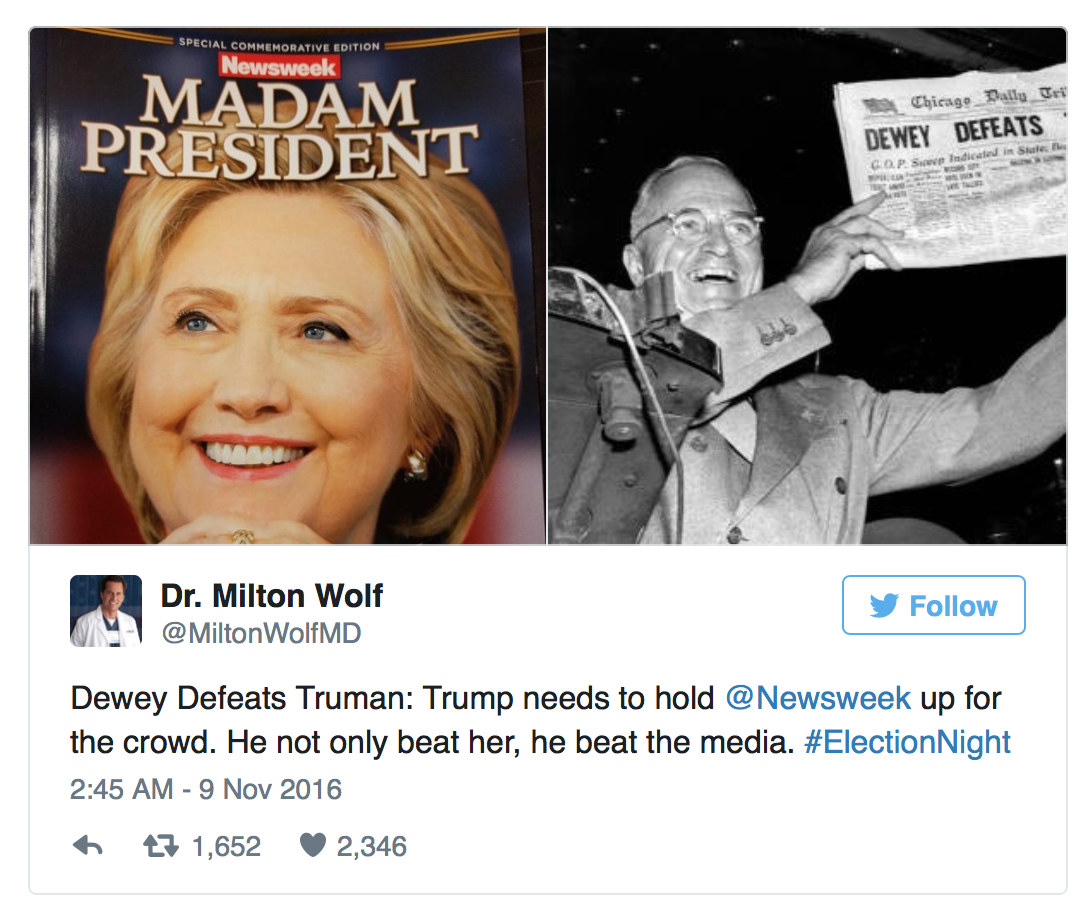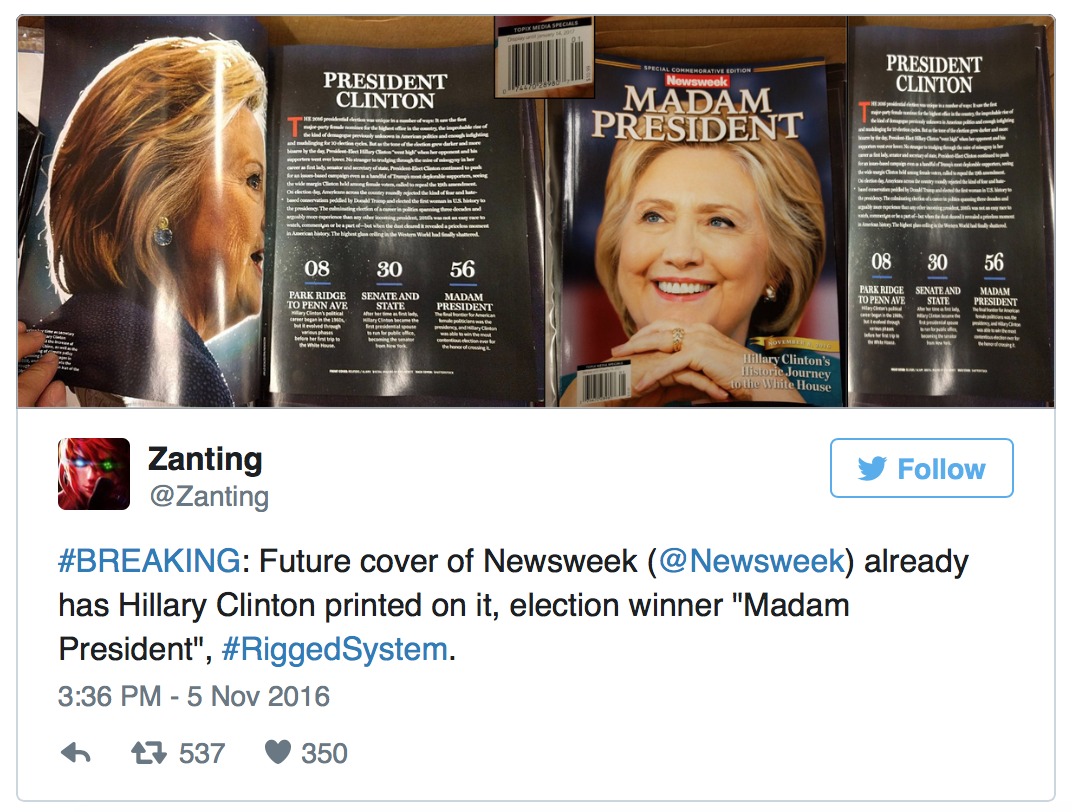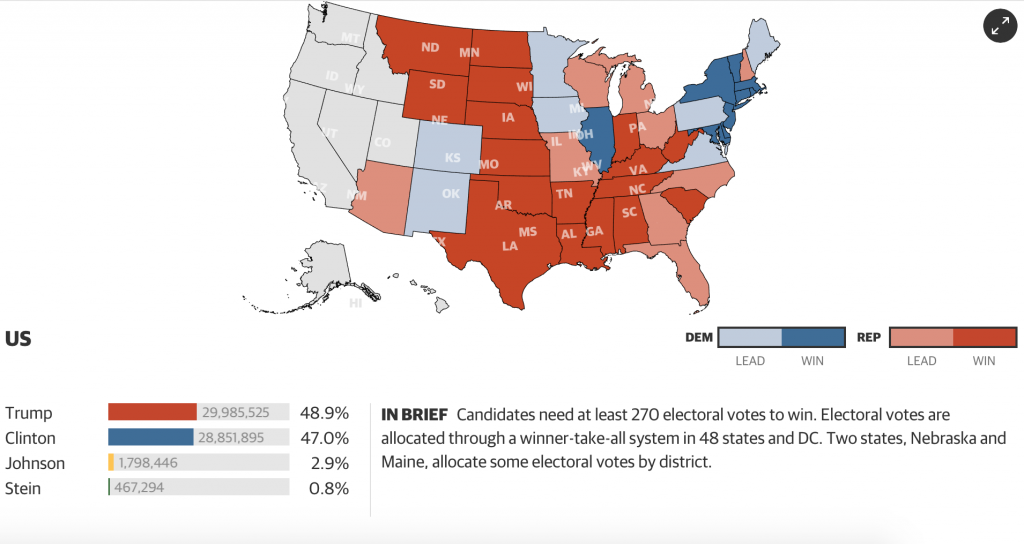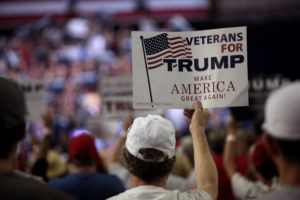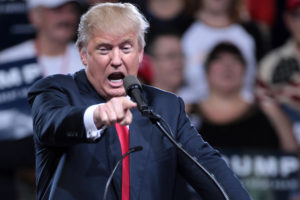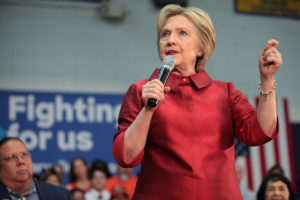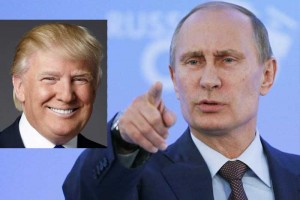Note: The following article was written up to the November 8 presidential election before Trump’s victory was declared
Know a man by his enemies. Trump has countless enemies, but most of them march to the drums of endless wars of aggression and care less about the casualties of tens of millions of lost good jobs in America. Most are neo-liberals in fact, the bipartisan doctrine of dispossession of citizens and foreign wars to grow the system further. The worst have been Washington servants of the world corporate machine looting the world. They above all condemn his peace overtures to Russia and his promise to repeal NAFTA – both unspeakable heresies on the US public stage until Trump’s movement against them.
HiIlary Clinton is a perfect enemy of Trump. She has become rich in office, and as Harry Truman said “anyone who gets rich in politics is a crook”. She has dedicated her life to political power at the top while growing ever wealthier from its use. And she loves foreign wars. She has supported a long line of eco-genocidal attacks and bombings of Yugoslavia, Iraq, Libya, Syria, and Ukraine, all of them still in motion and waiting for her to be escalated further.
She wants a return to this bombing in Syria as a “free-fly zone” – free for US and NATO bombers – just as she led Libya’s destruction from 2011 on. She abuses Russia and slanders Putin at every opportunity and she supported the neo-Nazi coup overthrowing the elected government of Ukraine and the civil war since. She has done nothing but advocate or agree to endless US-led war crimes without any life gain but only mass murder, social ruin and terror which she ignores. Like her mentor Madeleine Allbright , even the deaths of hundreds of thousands of children in Iraq by Clinton-led bombing are “worth the price”.
Where Trump agrees with the US money-and-war party is on Israel and Iran. He started with a policy of more neutrality towards the Israel-Palestine conflict, but soon backed out when the attack-dogs went into action with a $50 million gift for his campaign from a wealthy Zionist at the same time. Then he declared “ Israel is America”. So Trump can proclaim opposite positions without a blink, including on the continuous war crimes of Israel supported by the US.
Trump also bellows against on the giveaway of many billions of US money to Iran and prefers to bomb their nuclear facilities as Israel wants, and has already done in Syria. He does not tell his audience that all of this US money is Iran’s money being returned to it from its US seizure in exchange for its nuclear disarmament never suggested for Israel which has enough nuclear weaponry to blow up the whole Middle East and beyond. Trump too is not to be trusted when it suits his run to be US President. Yet even here Trump still holds to his position that use of nuclear weapons means “game over”. Clinton and the bipartisan money-and-war party express no such constraint.
Why the Establishment Hates Trump, But Will Accept Him
All of them have reason to hate Trump for a more basic reason. He is seemingly alone in the money-media-military establishment to publicly deplore the rigged electoral system in which big money and media rule – formerly unspeakable in the press and political discussion on stage. Trump has even voiced suspicion of the 9-11 killing spectacle and the “six-trillion- dollar” haemorrhage of US money on Middle East and Afghanistan wars propelled and justified by 9-11 from 2001 on.
Yet here again the problem is that Trump backs off as soon as he thinks he will not be able to sell it. This is the art of political lying at which Trump, like Reagan, is a master. But the hard-line difference between Trump and Reagan and neo-con-lib rulers over the last 30 years is deep – Trump’s denunciation of NAFTA and willingness to have peace with other nations not bowing to Uncle Sam.
Before Trump, job-destroying edicts of transnational global corporations and captive states called ‘free trade’ have been anathema to oppose in official society. But Trump sticks to his heretical position. Right up to the election he has promised a “35% tariff” on products of US factories that disemploy workers to get cheaper labor elsewhere. No-one in the US political establishment has risked such a position, or blamed these corporate-rights treaties for hollowing out American society itself. It is apostasy in the corporate ‘free press’.
Trump is still hated for such deviations from the official corporate-state line. But the haters cannot say this. They stick to the politically correct repudiations, and call him “racist”, “sexist”, “bigot” and so on even if the conclusion does follow from what he says or does. Selected instances are the ruling fallacy here.
Trump and the Media-Lie System
Trump is unique in calling out the major mass media as continuous purveyors of lies and propaganda – although he centers it on himself and not global corporate rule across borders which they worship. Anyone not doing so is excommunicated from the press. This profound disorder is never allowed into the mass media as an issue, and Trump never raises it. He too is a believer, but one who sees the life costs of the sacrifice-workers rule inside the US. He also advocates job-creating public spending on physical infrastructure which is as crucial to his movement as it was to FDR. It is no longer taboo inside the dumkopfen party
Trump is a first. Never before has anyone been able to denounce the mass media framing, half-truths and fabrications and still come out stronger The onslaught of ideological assassination by a hireling intelligentsia and media of record like the New York Times has always succeeded before. Trump reacts only as it affects his own position, but his raw defiance right into the cameras has been eye-popping and unique in America.
This may be Trump’s most remarkable achievement. He has been slandered and demonized more than Russia’s Putin, and Russia-baiting him with McCarthy-like accusations of collaboration with Putin has been part of the attack by Hillary and the press. Yet passionate voter support of Trump has still grown in the face of all this denunciation by the political establishment.
An underlying revolution in thinking has occurred. Trump has tapped the deep chords of worker rage at dispossession by forced corporate globalization, criminally disastrous Middle East wars, and trillions of dollars of bailouts to Wall Street. He never connects the dots on stage. But by Clinton’s advocacy of all of them, she has made them her own and will go down because of it.
Trump’s unflinching vast ego and media savvy have been what she and the political establishment are too corrupted to defeat, The underlying contradiction that now raises its head pits the mass media against the President of the United States himself – against the long sacred office of the commander-in-chief of US power across the world, precisely what he is proposing to pacify with friendly relations instead of ruinous war invasions as in Iraq. Many observers think that Wall Street and big money won’t let it happen. Or that Trump will like others before him will be determined by the office. Or that Clinton’s billion dollars of PAC money will succeed work in the end. But the meaning is out and cannot be reversed out of sight.
Whatever happens next in this saga it will be ground-shaking. The worst that can happen to Trump’s enemies is that he wins despite the all-fronts attack. They define his underlying meaning, just as the Enemy they construct abroad defines them. If he loses, there will be a carnival of the money-war-media party pretending a healing of the great division that has come to view. But this is not a Republican-Democrat division. It is as deep as all the lost jobs and lives since 2001, and it is ultimately grounded in the tens of millions of dispossessed people which the life-blind global market system and its wars have imposed on America too.
The Great Division Will Not Go Away
Trump is the closest to an egomaniac that has ever run for the presidential office. If he were not, he could not have withstood the public shaming heaped upon him by the political establishment and dominant media everywhere.
But the tens of millions of Americans for whom Trump speaks tend to have one thing in common more than anything else. They have been dispossessed and smeared by the neo-con/ neo-liberal alliance that has taken or traded away their life security and belittled them with political correctness – the establishment’s patronizing diversion from their fallen state.
All the while, the ruling money party behind the media and the wars is system-driven to seek limitlessly more money under masks of ‘free trade’ and “America’s interests abroad’. The majority is left behind as the sacrificial living dead. Multiplying transnational money sequences of the very rich have bled the world into a comatose state, and perpetual wars against the next Enemy of the cancerous system have sown chaos across the world.
Trump at least starts remission by seeing a criminally blind rule and chaos inside America itself. Before his campaign, there was helplessness against the invading wars and money sequences always profiting from the global ruin. The reality has been taboo to see in public. Only entertainments have appeared in ever new guises as the corporate money-and-war machine has rolled and careened on across all borders, now marching East through Ukraine into Russia, Brazil to Venezuela to the Caribbean, from the Congo to the South China Sea.
The Trump entertainment, the most watched in the world, may be the long bridge to taking down the neo-liberal pillars of majority dispossession and war-criminal state.
Trump is the Opposite to Reagan in Policy Directions
On the face of it, Trump is an ideal leader for US empire. He is like Ronald Reagan on steroids. His long practiced camera image, his nativist US supremacism, his down-home talk, and his reality-show confidence all go one better. He is America come to meet itself decades down the road as its pride slips away in third-world conditions.
But unlike Reagan and Bush who spoke to the rich becoming richer, Trump speaks to the losing white working class and those who have come to hate the money-corrupted Washington forging the policies of dispossession Reagan started.
Washington has since ignored and patronized their plight over 30 years. Trump’s constituency has been the disposable rejects from the corporate global system that it is rigged from top to bottom with rights only for the profits of transnational abroad and bought politicians at home.
The Trump constituency may have no clear idea of this inner logic of the system. But they directly experience the unemployment, underemployment, ever lower pay, deprived pensions, degraded living conditions, public squalor, contempt from official society, and no future for their children.
At the surface level, what drives them mad is the ‘political correctness’ that diverts all attention from their plight to pant-suit ‘feminists’ getting a leg up, racial rights with no life substance, sexual queers they had been conditioned to abhor, and other symbols of oppression changed as the actually ruling system of dispossession becomes inexorably worse all the way down to their grand children.
Here too Hillary Clinton has been an embodiment of the smug ideology of the system that bleeds the unseen job-deprived into powerless humiliation: an existential crisi where the secure jobs and goods of US life have been stripped from them in continuous eviction from the American way with no notice.
While Trump’s narrative is that the American Dream seeks recovery again, the dominant media and political elite relentlessly denounce him for his message. He gives lots of ammunition to them. His most popular line is “build the wall”, “build the great wall” between Mexico and the US. No political correctness cares that the biggest source of near-slave labor for the big businesses of the US South is Mexican ‘illegals’, and Trump himself never mentions this. He prefers to blame the Mexican illegals themselves for drugs, rape and violence, the standard lie of blame-the-poorer for your problems. Trump also wants to tax their slim earnings to pay for the wall. This is the still running sore of America beneath the lost jobs.
Trump has thus attracted lots of votes. But many non-ignorant people too recognise that the tens of millions of illegal migrants seeking work in the richer USA cannot continue in any country with borders, or any nation that seeks to keep worker wages up not down by lower priced labor flooding in. The legal way must be the only way if the law of nations is to exist and working people are to be secure from dispossession by starvation wages illegal migrants can be hired for. Borders are, few notice, the very target of the carcinogenic neo-liberal program.
Of course the political discourse never gets to this real and complex economic base of the problem. Nor does Trump. His choral promise is “’l’ll fix it. Believe me”. But something deeper than demagoguery and blaming the weak is afoot here. An untapped historic resentment is boiling up from underneath which has long been unspeakable on the political stage. Trump has mined it and proposed a concrete solution – one grand gate through which immigrants must pass.
Is this really racist? It is rather that Trump is very good at bait and switch. From his now deserted promise to halve the Pentagon’s budget to getting the Congress off corporate-donation payrolls, now by fixed congressional terms, the public wealth that the politicians and corporate lobbies stand to lose from a Trump presidency is very disturbing to them. The Mexican wall does not fit the borderless neo-liberal program either. But all of it is welcome to citizens’ ears. That is why the establishment hates Trump for exposing all these issues long kept in the closet and covered over by politically correct identity politics.
On the other hand, Trump leaves the halving of the Pentagon’s budget behind as soon as he sees the massive private money forces against it. It is Reagan in reverse. He now promises hundreds of billions more to the military – but he still opposes foreign wars. That might even do it. But this most major issue of the election has been completely ignored by the media and opposing politicians alike. It is the historic core of his bid for the presidency.
Yet the US political establishment across parties cannot yet even conceive it so used are they to the Reagan-led war state, the military corporate lobbies paying them off in every Senate seat, anti-union policies at macro as well as micro levels, and always designated foreign enemies to bomb for resistance. “Say Uncle” said Reagan to the Sandinistas when they asked what could stop the mercenary killers paid by US covert drug running from bombing their harbours, schools and clinics.
Trump is going the opposite direction in foreign affairs, but the establishment commentators call it “isolationist” to discredit it. Clinton talks of overcoming the divisions in America, but has never mentioned holding back on foreign wars. On the contrary, she approves more war power against Russia and in Syria and in the Ukraine. This is the biggest danger that no media covers – ever more ruinous US wars on other continents. The formula is old and Reagan exemplified it. Russia is portrayed as the evil threat to justify pouring up to two billion dollars-a-day of public money into the US war-for-profit machine occupying across the world, now prepping for China.
But the bipartisan war party backed by Wall Street is going down if Trump’s policy can prevail. This may be the salvation of America and the world, but it is silenced up to election day.
Trump Against the Special Interests
At the beginning g of his public campaign, Trump’s policy claims threatened almost every big lobby now in control of US government purse strings. And these policies grounded in no more foreign wars which have already cost over ‘six trillion dollars’ of US public money. At the same time, the country’s physical infrastructures degrade on all levels, and its people’s lives are increasingly impoverished and insecure for the majority. Trump promises to rebuild them all.
Yet the cut-off of hundreds of billions of public giveaways to the Big Corps that Trump advocated did not end here. It hit almost every wide-mouthed transnational corporate siphon into the US Treasury, taxpayers’ pockets and the working majority of America. Masses of American citizens increasingly without living wages and benefits and in growing insecurity listened to what the political establishment and corporate media had long silenced.
Trump raised the great dispossession into the establishment’s face, and this is why he will win. “In the souls of the people the grapes of wrath are filling and growing heavy, growing heavy for the vintage”.”The grapes of wrath have risen from the long painful stripping of the people’s livelihoods, their social substance and their cities by corporate globalization selecting for the limitless enrichment of the few living off an ever-growing takes from public coffers and the impoverishment of America’s working citizens. A primal rage has united them across party lines in the public person of Donald Trump.
Can he deliver? Well he certainly has shown the guts necessary to do so, most uniquely in facing down the corporate media and Washington politicians.
Looking Past the Victory
The issue still remains that Trump does not promise any fixing of the greatest transfer of wealth to the very rich in history that Reagan started. This great transfer of wealth includes his own. We may recall that his model Ronald Reagan started this Great Dispossession to “make America great again” too.
Now Trump has promised a massive tax cut to the rich and private capital gains as Reagan did. In the meantime nothing has been less talked about in election commentary than the globally powerful interests Trump promised to rein back from the public troughs bleeding the country’s capacities to build for and to employ its people. On this topic, there has been only silence from the media and politicians, and retreating vague generalizations from Trump.
At the beginning, he not only went after the foreign wars, but the sweetheart deals of the government with Big Pharma, the health insurance racket, lobby-run foreign policy, off-shore tax evasion, and global trade taking jobs in the tens of millions from home workers. This is why the establishment so universally hated him. Most of their private interests in looting public wealth were named. He reversed the tables on the parasite rich in Washington lobbying and gobbling up public money faster than it could be bribed, printed and allocated to their schemes – except on real estate, his own big money ‘special interest’ not centered in Washington. Indeed Trump loves ‘eminent domain’, state seizure of people’s private property for big developers like him.
This is where Trump joins hands with those depending on the deep system corruptions he has promised to reverse. He even asked, in his loud way, how these huge private interests go on getting away with a corporate-lobby state transferring ever more public wealth and control to them at the expense of the American working majority and their common interest as Americans. But it had all pretty well slid away by election day except the hatred of self-enriching Washington fixers like Hillary, Mexican illegals, the Obamacare new charges (with no mention of the HMO’s doing it), and the disrespect for people bearing arms by the second-amendment right.
Do we have here the familiar positional determinism where political and economic class leaders desert what they promised as they enter into elected office or have sold the goods?
Yet the victory Trump is about to reap is far from empty for America and the world if he keeps to the promises he made. The money-and media-rigged elections have stayed front and center where no-one in official politics dared say it before. The black-hole of US foreign wars has above all has remained his historic target.
His entire strategy has been based on getting public attention, and he is a master at it. He is unbuyably rich, has energy beyond a rock star, and is the most watched person in America across the country and the world for months on end. He can’t be shut up. Media stigmatization and slander without let-up do not work as always before.
Trump is also capable of meeting perhaps the world’s most important challenges, holding back the global US war machine from perpetual eco-genocidal aggression and investing back into public infrastructure and workers’ productive jobs.
Most importantly, Trump challenges “the Enemy” cornerstone of US ideology when he says “wouldn’t it be nice to get along with Russia and China for a change?” And as he said to Canada whose branch-plant corporate state still plays minion to its US corporate masters, “congratulations. You have become independent”.
As for Trump’s much publicized ‘denial of climate change, it is not really accurate. He has said little on the topic, but has expressed his opposition to “bullshit government spending” on preventing climate. So does James Lovelock, the famous global ecologist behind ‘the Gaia hypothesis ’. Certainly the green-wash hoaxes of the private corporations (and Al Gore) becoming much richer than before on solutions that do not work to prevent the global market-led climate destabilization do need more astute appraisal.
When you join the dots to Trump preaching a policy revolt against the insatiable corporate jaws feeding on trillions of dollars of public budgets in Washington, the underlying meaning emerges. He wants to stop the non-productive transnational corporations from feasting on the public purse. At the beginning after 2008, he even dared to recognize that Wall Street should be nationalized, as it once was by the American Revolution, Abraham Lincoln and FDR’s Federal Reserve. This would be as big a turn of US government in the people’s interests as stopping ruinous foreign wars.
Trump also once said that the US “must be neutral, an honest broker” on the Israel-Palestine conflict – as unspeakable as it gets in US politics. Big Pharma was also called out with “$400 billion to be saved by government negotiation of prices”. He even confronted the more powerful HMO’s with the possibility of a “one-payer system” far better than the Obamacare pork-barrel for ever higher insurance premiums.
Trump is no working-class hero. He has long been a predatory capitalist with all the furies of greed, egoism and self-promotion that the ruling system selects for. But he is not rich from foreign wars of aggression, or from exporting the costs of labor to foreign jurisdictions with subhuman standards. He has not been getting richer or more smug by seeking high office in a context of saturating slander and denunciation from official society. He has initiated a long overdue recognition of parasite capitalism eating out and wasting the life capacities of the US itself as well as the larger world.
Trump has now won the first major step that his enemies declared inconceivable, and he can now do what he has promised ‘in the place where the buck stops’.
Prof. John McMurtry is author of The Cancer Stage of Capitalism: From Crisis to Cure (available from University of Chicago Press) and an elected Fellow of the Royal Society of Canada.

